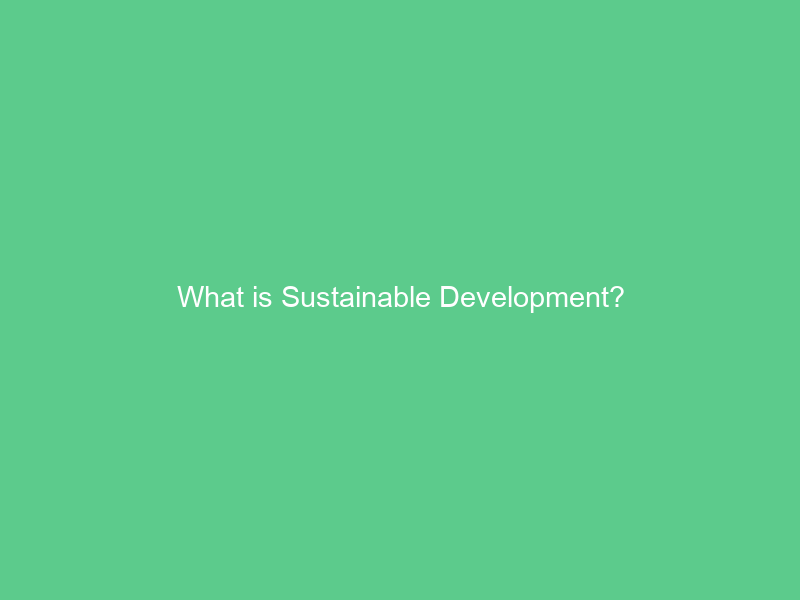Sustainable development refers to the long-term goal of living well without depleting Earth’s natural resources, and is the driving force behind 17 interlinked development goals set by the UN that cover environment, economy and society.
Imagine a world in which economic growth and decent work are sustainable, poverty has been eliminated, and natural resources are used responsibly.
Environmental Protection
Environmental protection is one of the central components of sustainable development, which aims to address issues like climate change, habitat destruction, ozone depletion, species loss and water pollution. Furthermore, it advocates for conserving natural resources as well as encouraging economic models that use them responsibly and reduce resource exploitation.
Responsible tourism includes encouraging the use of environmentally-friendly building materials, regenerative agriculture techniques, non-soil cultivation methods such as aquaponics and energy efficient designs; increasing public participation while cultivating a culture of social responsibility among businesses.
Sustainable development also relies heavily on international cooperation to realize its goals, from signing international agreements on environmental, economic and social matters through to technology transfer, research collaboration and capacity-building programs between nations. Furthermore, international cooperation plays an integral role in strengthening national and international disaster response capacities and recovery plans.
Economic Growth
Sustainable development encompasses more than just environmental protection: its aim is also economic growth and prosperity by adopting renewable energy sources, creating green jobs, alleviating poverty through social-impact investments, increasing agricultural productivity, responsible mining/tourism practices that reduce impacts to local communities and more.
Sustainable development began to emerge intellectually in the 1970s with modern natural resource management, conservation, and environmentalist movements. It gained widespread acceptance following publication of World Commission on Environment and Development’s 1987 report Our Common Future which defined sustainable development as development that meets current needs without jeopardising future generations’ ability to meet theirs.
Sustainable development must be grounded in justice-based systems; that is, it must consider justice when planning. This involves engaging in value and norm debates as well as using ethical reasoning and analysis techniques.
Social Equity
Sustainable societies rely on people having equal opportunities for economic and social advancement. To meet this objective, policies that encourage equal employment opportunities, supporting small and medium businesses, and implementing development-minded policies designed to promote entrepreneurship are of utmost importance.
Focusing on building resilience to climate disasters by reducing carbon emissions, strengthening disaster risk reduction efforts, and adopting circular economy practices are essential. Furthermore, this process involves limiting waste produced globally through increased recycling efforts, reuse programs and preventative measures.
Social sustainability centers around ensuring fairness within societal processes and institutions. This may involve combatting discriminatory practices, advocating for restorative justice practices and creating systems to empower marginalized populations; creating systems which promote community health and well-being as well as developing collaborative multidisciplinary approaches across boundaries and political jurisdictions to address both environmental and social challenges together is also key for sustainability.
Governance
Sustainable development is an economic goal which meets both present and future generations’ needs, taking into account Earth’s ecosystems and resources. It encompasses environmental protection, inclusive economic growth, social equity and governance as part of its core components.
Inequality and poverty pose significant barriers to sustainability, leading to social unrest, resource consumption and environmental degradation. Sustainable development initiatives should prioritize efforts aimed at decreasing inequality and eliminating poverty.
Focus should be put on improving human health and well-being through measures to reduce deaths caused by climate-related events, improve access to clean water and healthcare services, foster skills training and lifelong learning programs and develop sustainable infrastructure and more resilient communities that can withstand changing environmental conditions.
Sustainable development initiatives should emphasize efficient use of natural resources, implementing circular economy models to minimize waste, and strengthening conservation efforts that preserve critical natural habitats and biodiversity. Furthermore, sustainable development involves engaging stakeholders in decision-making processes so as to foster democratic societies.

